- Home
- André Aciman
Alibis Page 2
Alibis Read online
Page 2
And here lay Mendeleyev’s genius. He understood that, though he could plot every element, many elements hadn’t been discovered yet. So he left blank spaces on his table—for missing elements, for elements to come—as though life’s events were cast in so orderly and idealized a numerical design that, even if we ignored when they’d occur or what effect they might have, we could still await them, still make room for them before their time. Thus, I too look at my life and stare at its blind spots: scents I never discovered; bottles I haven’t stumbled on and don’t know exist; selves I haven’t been but can’t claim to miss; pockets in time I should have but never did live through; people I could have met but missed out on; places I might have visited, gotten to love, and ultimately lived in, but never traveled to. They are the blank tiles, the “rare-earth” moments, the roads never taken.
II
There is another fragrance, a woman’s perfume. No one I know has ever worn it. So there is no one to associate it with.
I discovered it one fall evening on my way home after a graduate seminar. In Cambridge, Massachusetts, there is a high-end drugstore on Brattle Street, and sometimes, perhaps to dawdle and not head home sooner than I had to, I’d take the long way and stop inside. I liked Brattle Street around Harvard Square, especially in the early evening when the shops were all aglow and people were coming back from work, running last-minute errands, some with children in tow, the bustling traffic of people giving the sidewalks a heady feel I grew to love, if only because it seemed rife with prospects for the evening I already knew were false. The sidewalk was the only place I felt at home in this otherwise cold, anonymous part of town where I wasted so much time and so many years alone, and where everyone I knew always seemed so very busy doing such small things. I missed home, missed people, hated being alone, missed having tea, had tea alone to invoke the presence of someone over tea.
On such evenings the Café Algiers was always crowded. It was good to drink tea with strangers, even if one didn’t talk to them. A ziggurat of Twinings tins stood on a cluttered counter behind the cash register. I would eventually try each tea, from Darjeeling to Formosa oolong to Lapsang souchong and gunpowder green. I liked the idea of tea more than the flavors themselves, the way I liked the idea of tobacco more than of smoking, of people more than of friendship, of home more than my apartment on Craigie Street.
The pharmacy stood at the end of a stretch of stores near the corner of Church Street. It was the last spot before I’d turn and head home. I stepped in one evening. Inside, I discovered an entirely different world from the one I’d imagined. The tiny pharmacy was filled with luxury beauty products, luxury perfumes, shampoos of all nations, Old World soaps, balms, lotions, striped toothbrushes, badgers, old-empire shaving creams. I liked it in there. The antique cabinets, the ancient wares, the whole obsolescence of the shop, down to its outdated razors and aging, Central European owners, all seemed welcoming, solicitous. So I asked—because you couldn’t loiter without buying something—for an aftershave I thought they wouldn’t have, only to find that they not only carried it but also sold its many companion products. So I was obliged to buy something I had stopped using a decade earlier.
A few days later I was back, not just because the pharmacy helped put off my unavoidable walk home, or because I wished to repeat the experience of opening a door and lighting upon a universe of bygone toiletries, but because the store had itself become a last stop in an imaginary Old World, before that world turned into what it really was: Cambridge.
I came again early one evening after seeing a French film at the Brattle Theater. During the showing, it had started to snow outside, and the snow, fast piling on Cambridge, gave every sign of turning into a blizzard that night. A luminous halo hung over Brattle Street just outside the theater, as it had in the small town of Clermont-Ferrand in the movie. In the near-total absence of traffic, some neighborhood children had gathered outside the Casablanca restaurant with their sleds and were about to head down toward the Charles River. I envied them.
I did not want to go home. Instead, I decided to trundle over to my pharmacy. It seemed as good a destination as any. I pushed in the glass door as fast as I could, stamping my feet outside before taking shelter within. A young blond woman with a boy of about four was standing inside, holding a handkerchief to her son’s nose. The boy made an effort to blow but wasn’t successful. The mother smiled at him, at the salesgirl, at me, almost by way of apology, then folded the handkerchief and applied it to his nose again. “Noch einmal,” she added. The boy, sticking his head out of a red hood, blew. “Noch einmal,” she repeated with a tone of gentle entreaty, which reminded me of my own mother when she implored me to do things that were good for me, her voice filled with so vast a store of patience that it suddenly reminded me of how distant I’d grown from the love of others. Within moments, a cold whiff of air blew into the store. The mother had opened the door and, with her child bundled up, walked out into the snow.
Only the salesgirl and I were left. Perhaps because she was no longer in the mood for business on such a spellbound evening, or because it was almost closing time, the salesgirl, who knew me by then, said she would let me smell something really special, and named a perfume.
Had I heard of it? I thought I had—on second thought, I wasn’t sure. She ignored my attempted fib, and proceeded to open a tiny vial. Having moistened the glass stopper with the perfume, she dabbed it on her skin and in a gesture that made me think she was about to caress me on the cheek—which wouldn’t have surprised me, because I’d always felt she had a weakness for me, which was also why I’d come back—she brought an exposed smooth wrist gently to my lips, which I would have kissed on impulse if I hadn’t already seen the gesture performed at perfume counters.
No fragrance I’d ever known before smelled anything remotely similar to this. I was at once in Thailand and in France and on a vessel bound for the Bosporus with women who wore furs in the summer and spoke of Webern’s Langsamer Satz as they turned to me and whispered “Noch einmal?” It eclipsed every fragrance I’d known. It had lavender, but lavender derealized, deferred, dissembled, which is why I asked her to let me smell her wrist again, but she’d seen through my request, and wasn’t sure, as I wasn’t sure, that it was limited to perfume alone. Instead, she dabbed the bottle stopper on a scent strip, which she snapped out of a tiny wad filled with other strips, waved the paper ever so lightly in the air to let it dry, and then handed it to me, with a look of complicity that suggested she wasn’t about to be fooled by my curiosity and had already guessed that there were at least two women in my life who’d want nothing more than to see the scent strip I’d bring home that evening turn into a gift vial within days. That look flattered me no end.
I came back two evenings later, and then again, not for the store now, not for the snow, or for the elusive luster that hovered over Brattle Street in the evening, but for the revelation in that perfume bottle, for the women in furs who smoked Balkans aboard a yacht while watching the Hellespont drift in the distance. I did not even know whether the perfume was my reason for being in there or whether it had become an excuse, the mask behind the mask, because if it was the salesgirl I was after, or the women that the flicker in her eyes had invoked, I also felt that behind her was the image of another woman, my mother, in another perfume store, though I sensed that she too, perhaps, was nothing more than a mask, behind which was my father, years and years ago now, as he stood by the mirror, pleased to be the man he was when he dabbed lavender water on his cheeks after shaving. He too, like all the others now, reduced to a threadbare mask for the love and the happiness I was trying to find and despaired I’d never know. The scent summoned me like a numinous mirage from across a divide so difficult to cross that I thought it might not have anything to do with love either, for love couldn’t be the source of so much hardship, and therefore perhaps that love itself was a mask, and that if it wasn’t love I was after, then the very tip of this vortex around which I’d been circl
ing had to do with me—just me—but a me that was squandered on so many spaces, and on so many layers, that it shifted like mercury the moment I touched it, or hid away like lanthanides, or flared up only to turn into the dullest substance a moment later.
The perfume was so expensive that all I could take with me, after coming up with more excuses, which seemed to prove to the salesgirl that there were other women in my life, was a sprinkle on a paper strip. I kept the strip with me, as if it belonged to someone who had gone away for a while and wouldn’t forgive me if I didn’t sniff it each day.
About a week later, after seeing the same film, I rushed out of the theater and headed toward the pharmacy, only to find that it had already closed. I stayed around for a few minutes, thinking back to the evening when I’d seen the mother and son there, remembering her blond hair bundled under her hat and her eyes that had roamed around the store and lingered on mine while she urged her son on, sensing I both wanted and envied her. Had she overplayed her maternal gaze to forestall any attempt at conversation? Had the salesgirl intercepted my glance?
Now I pictured mother and son coming out of the store, the mother struggling to open her umbrella on Church Street as they headed toward the Cambridge Common, plodding across the empty field with their colored boots sinking deep into the snow, their backs forever turned to me. It felt so real, and they seemed to disappear with such haste as the wind gusted at their backs that I caught an impulse to cry out with the only words I knew: “Frau Noch Einmal … Frau Noch Einmal…”
At the time I thought they were an imaginary wife and an imaginary son, the ones I so desperately wished might be mine one day. Me coming back from work and getting off at Harvard Square, she on a last-minute errand before dinner, buying him a toy at the drugstore because she’d promised him one that morning—So what if we spoiled him a bit! Just fancy, running into each other in the snow, on this day of all days. But now, through the distance of years, I think she may have been my mother, and the little boy, me. Or perhaps all this is, as ever, a mask. I was both me and my father, me as a student who’d gone to the movies instead of the library, me as the boy’s better father, who’d probably have let him savor childhood a bit longer, me in the future giving the boy vague tips about things to come, all of it reminding me that the crib notes we sneak through time are written in invisible ink.
The boy from the pharmacy is thirty years old today—five years older than I was on the day I felt old enough to be his father. Yet, if I am younger still today than he is at thirty, I was on that day in the snow far older than either of us is today.
From time to time I revisit that perfume, especially when I wade through the cosmetics counters on the first floor of large department stores. Invariably I play dumb—“What’s this?” I ask, playing the hapless husband trying to buy a last-minute gift. And they tell me, and they spray it for me, and they give me sample strips, which I stick in my coat pocket, and take them out, and put them back in, dreaming back to those days when I dreamt of a life I’m no longer sure I lived.
Perhaps fragrance is the ultimate mask, the mask between me and the world, between me and me, the other me, the shadow me I trail and get hints of but cannot know, sensing all along that talk of another me is itself the most insidious mask of all. But then perhaps fragrance is nothing more than a metaphor for the “no” I brought to everything I saw when I could so easily have said “yes”—to myself, to my father, to life—perhaps because I never loved any of the things of the world well enough and hoped to hide this fact from myself by thinking I could do better by looking elsewhere, or because I loved and wanted each fragrance and couldn’t determine which to settle for, and therefore stored the very best till a second life rolled in. As irony would have it, the one perfume I want is the one I never purchased. It is also the one every woman I’ve known has cunningly refused to wear. So there is no one to remember it by. The perfume conjures an imagined life, it conjures no one.
* * *
Last winter I returned to the same pharmacy with my nine-year-old son. We did the rounds, as I always do nowadays whenever I go back to places I’ve spun too many yarns over to even bother wondering whether I’ve ever loved them or not. As usual, I pretend to be looking for a perfume for my wife. “Do you think Mom would like this one?” I ask my son, hoping he’ll say no, which he does. I apologize. We look at toothbrushes, soaps, ancient toothpastes; even my father’s aftershave sits before me, staring almost with reproof. I let him smell it. He likes it. I ask whether he recognizes it. He does. We sample another. He likes that one too. He is, I catch myself hoping, making his own memories.
Finding nothing to buy, we open the glass door and leave. Taking a quick right, we walk toward the Common. I try to tell him that I’d once had a glimpse of him there almost three decades ago. He looks at me as if I’m crazy. Or was it just me I’d seen decades ago, I ask. This is crazy too, he says. I want to tell him about Frau Noch Einmal, but I can’t find the right words. Instead I tell him I am glad he is with me. He cracks a joke. I crack one back.
But I stop all the same and stand a moment on the very same spot and remember the night I’d nearly shouted Noch einmal to the winds on the snowed-on, empty Cambridge streets, thinking of the German woman and of her lucky husband coming back from work every evening. Here, at twenty-five, I had conjured the life I wished to live one day. Now, at fifty, I was revisiting the life I’d dreamed of living.
Had I lived it? Had I lived my life? And which mattered more and which did I recall best: the one I’d dreamed up or the one I indeed led? Or am I already forgetting both before my time, with life taking back, one by one, the things I thought were mine to keep, turning the cards face down, one by one, to deal someone else another hand?
La Bouilladisse, June 2001
The house where we’re staying near Aix-en-Provence is surrounded by lavender bushes that seem to billow and wave whenever a wind courses through the fields. Tomorrow is our last day in Provence, and we’ve already washed all our clothes to let them dry in the sun. I know that the next time I’ll put on this shirt will be in Manhattan. I know too how the scent of sunlight and lavender trapped within its folds will bring me back to this most luminous day in Provence.
It is ten o’clock in the morning and I am standing in this garden next to a wicker hamper that is filled with today’s wash. My wife doesn’t know it yet, but I’ve decided to hang the laundry myself. It’s meant as a surprise. I’ve already brewed coffee.
So here I am, hanging one towel after the other, the boys’ underwear, their many T-shirts, their socks flecked with the reddish clay from Roussillon which, I hope, will never wash off. I like the smell. I like separating the shirts on the line, leaving no more than half an inch between them. I must manage my pins and use them sparingly, making sure I’ll have enough for the whole load. I know my wife will still find something to criticize in my method. The thought amuses me. I like the work, its mind-numbing pace that makes everything seem so simple, so complacent. I want it never to end. I can see why people take forever to hang clothes out to dry. I like the smell of parched wood on the clothespins, which are stored in a clay pot. I like the smell of clay too. I like the sound of drops trickling from our large towels onto the pebbles, on my feet. I like standing barefoot, like the sheets, which take forever to hang evenly and need three pins, one at each end and one for good measure in the middle. I turn around and, before picking up another shirt, I run my fingers through a stalk of lavender nearby. How easy it is to touch lavender. To think I fussed so much and for so long—and yet here it is, given to me, the way gold was given to the Incas, who didn’t think twice before handing it over to strangers. There is nothing to want here. Quod cupio mecum est. What I want, I already have.
Yesterday we went to see the abbey of Sénanque. I took pictures of my sons standing in front of a field of lavender. From a distance, the lavender is so dark it looks like a bruise upon a sea of green. Closer by, each plant looks like an ordinary overgrown bush. I
taught them how to rub their hands along lavender blossoms without disturbing the bees. We spoke of Cistercian monks and the production of dyes, of spirits, balms, and scented extracts, and of Saint Bernard de Clairvaux, and of medieval commerce routes that still exist today and that spread from these tiny abbeys to the rest of the world. For all I know my love of lavender may have started right here, in an essence gathered from bushes that grow on these very same fields. For all I know this is where it ends, in the beginning. And yet, for all I know, everything could start all over again—my father, my mother, the girl with the perfumed wrist, Frau Noch Einmal, her little boy, my little boy, myself as a little boy, the walk in the evening snow, the genie in the bottle, the Rosetta stone within each one of us that nothing, not even love or friendship, can unburden, the life we think of each day, and the life not lived, and the life half lived, and the life we wish we’d learn to live while we still have time, and the life we want to rewrite if only we could, and the life we know remains unwritten and may never be written at all, and the life we hope others may live far better than we have, all of it, for all I know, braided on one thread into which is spun something as simple as the desire to be one with the world, to find something instead of nothing, and having found something, never to let go, be it even a stalk of lavender.
Intimacy
I finally went back to Via Clelia. I had passed by the first time I returned to Rome almost forty years ago, then a second time fifteen years later, and still another three years after that. But for reasons that had more to do with my reluctance to come back here, these visits occurred either by night, when I couldn’t see a thing, or when I didn’t dare ask our cabby to make a right and stall awhile to let me see our old home again. From Via Appia Nuova, a bustling working-class artery, all I ever caught was a distant glimpse of Via Clelia. After that third time, I stopped trying. In Rome, whenever I go back, I never venture beyond the center.

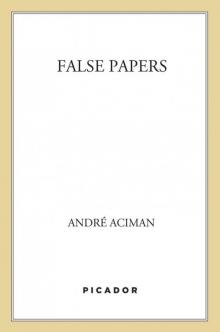 False Papers
False Papers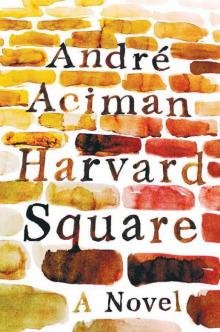 Harvard Square
Harvard Square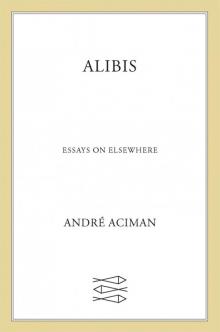 Alibis
Alibis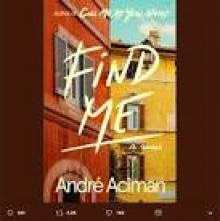 Find Me
Find Me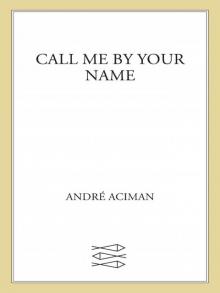 Call Me by Your Name
Call Me by Your Name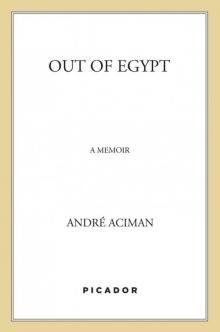 Out of Egypt: A Memoir
Out of Egypt: A Memoir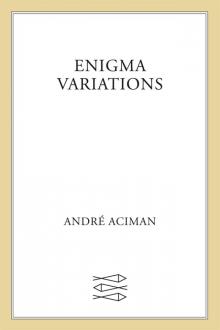 Enigma Variations
Enigma Variations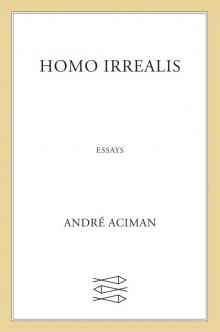 Homo Irrealis
Homo Irrealis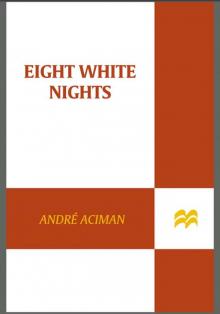 Eight White Nights
Eight White Nights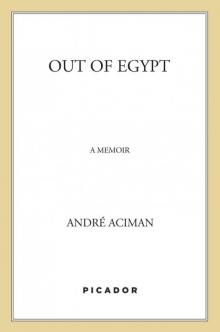 Out of Egypt
Out of Egypt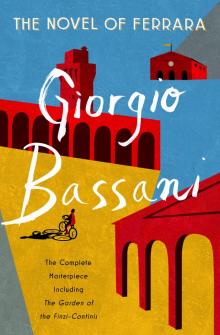 The Novel of Ferrara
The Novel of Ferrara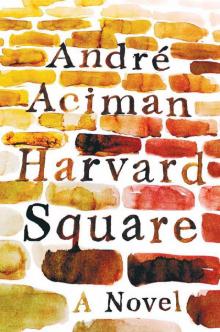 Harvard Square: A Novel
Harvard Square: A Novel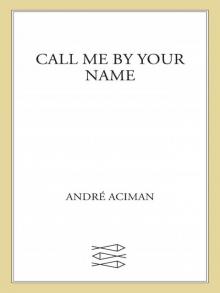 Call Me by Your Name: A Novel
Call Me by Your Name: A Novel